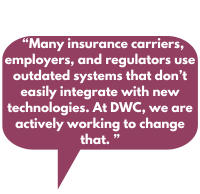Texas Department of Insurance, Division of Workers' Compensation

IAIABC: Please provide an organizational overview (number of employees, years in business, vision)
Kate Sidora, Director of External Relations, TDI, Division of Workers' Compensation: The Texas Department of Insurance, Division of Workers’ Compensation (DWC) has about 400 full-time employees with a central office in Austin and 20 regional field offices across Texas.
At DWC, we strive to be helpful, courteous, ethical, and professional while fulfilling our mission to:
- Regulate the Texas workers’ compensation system efficiently.
- Educate system participants.
- Achieve a balanced system in which everyone is treated fairly with dignity and respect.

IAIABC: How does your organization serve the workers’ compensation industry?
KS: DWC administers and regulates the Texas workers’ compensation system. Under the direction of its appointed commissioner, DWC monitors compliance among all system participants, including injured employees, employers, health care providers, insurance carriers, and attorneys.
DWC also:
- Ensures costs are kept at a reasonable level for policyholders.
- Provides education to promote healthy and safe workplaces.
- Informs system participants of their rights and responsibilities.
- Promotes communication between system participants to minimize the likelihood of disputes.
- Resolves disputes quickly and fairly.

IAIABC: What do you see as some of the major challenges the industry is facing, and how can we as a community address them?
KS: Many insurance carriers, employers, and regulators use outdated systems that don’t easily integrate with new technologies. At DWC, we are actively working to change that. There is vast potential to become more efficient and effective with tools like artificial intelligence, advanced automation, and increased access to technology for injured employees.
The key to success lies in balancing innovation with our commitment to data privacy, security, and preserving the human element of workers’ compensation. Together with our system participants, we can achieve this through collaboration, transparency, and education. This approach ensures that changes align with industry advancements, while delivering quality outcomes for employees and their employers.
At DWC, we have a unique opportunity through our modernization plan to demonstrate to stakeholders how technology can help reduce costs, speed up claims processing, improve accuracy, and enhance outcomes.
IAIABC: Are there any projects/programs/initiatives going on at your organization that you are particularly excited or enthusiastic about?
KS: As part of our modernization plan, DWC continues to focus on improving efficiency and collaboration for all system participants.
Our latest project will replace our legacy claims management system, COMPASS, which has been in use since 1991. This multi-year IT modernization project will build and maintain a web-based dispute resolution system. Workers’ compensation system participants will use this new system to file disputes, schedule proceedings, and exchange documents. It will also significantly improve internal agency functions and processes for all DWC employees. 
IAIABC: What's an interesting fact about your organization that most people don't know?
KS: Texas is the only state that allows private employers to choose whether they will provide workers' compensation coverage.
The first workers' compensation laws in Texas were enacted in 1913 and held fast to the principle that employers should have the option to choose whether to offer workers' compensation benefits to their employees. In 1917, the U.S. Supreme Court ruled that it was lawful to require employers to choose whether to participate in a state's workers' compensation program. Texas revised its workers' compensation laws in 1917 but continued to allow employer participation in the system to remain voluntary.
IAIABC: Why is your organization a member of the IAIABC? What would you tell others about the benefits of membership?
KS: DWC benefits greatly from our IAIABC membership. This membership is an invaluable resource that allows us to connect with other jurisdictions and industry professionals and learn from each other’s experiences. It’s inspiring to come together to discuss complex issues and find innovative ways to advance the workers’ compensation industry.
